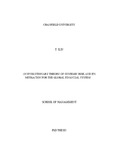JavaScript is disabled for your browser. Some features of this site may not work without it.
| dc.contributor.advisor | Nellis, Joe | |
| dc.contributor.advisor | Varga, Liz | |
| dc.contributor.author | Ilin, Thomas | |
| dc.date.accessioned | 2015-06-22T14:21:05Z | |
| dc.date.available | 2015-06-22T14:21:05Z | |
| dc.date.issued | 2014-01 | |
| dc.identifier.uri | http://dspace.lib.cranfield.ac.uk/handle/1826/9285 | |
| dc.description.abstract | This thesis is the outcome of theory development research into an identified gap in knowledge about systemic risk of the global financial system. It takes a systems-theoretic approach, incorporating a simulation-constructivist orientation towards the meaning of theory and theory development, within a realist constructivism epistemology for knowledge generation about complex social phenomena. The specific purpose of which is to describe systemic risk of failure, and explain how it occurs in the global financial system, in order to diagnose and understand circumstances in which it arises, and offer insights into how that risk may be mitigated. An outline theory is developed, introducing a new operational definition of systemic risk of failure in which notions from evolutionary economics, finance and complexity science are combined with a general interpretation of entropy, to explain how catastrophic phenomena arise in that system. When a conceptual model incorporating the Icelandic financial system failure over the years 2003 – 2008 is constructed from this theory, and the results of simulation experiments using a verified computational representation of the model are validated with empirical data from that event, and corroborated by theoretical triangulation, a null-hypothesis about the theory is refuted. Furthermore, results show that interplay between a lack of diversity in system participation strategies and shared exposure to potential losses may be a key operational mechanism of catastrophic tensions arising in the supply and demand of financial services. These findings suggest new policy guidance for pre-emptive intervention calls for improved operational transparency from system participants, and prompt access to data about their operational behaviour, in order to prevent positive feedback inducing a failure of the system to operate within required parameters. The theory is then revised to reflect new insights exposed by simulation, and finally submitted as a new theory capable of unifying existing knowledge in this problem domain. | en_UK |
| dc.language.iso | en | en_UK |
| dc.publisher | Cranfield University | en_UK |
| dc.rights | © Cranfield University 2014. All rights reserved. No part of this publication may be reproduced without the written permission of the copyright owner | en_UK |
| dc.title | An evolutionary theory of systemic risk and its mitigation for the global financial system | en_UK |
| dc.type | Thesis or dissertation | en_UK |
| dc.type.qualificationlevel | Doctoral | en_UK |
| dc.type.qualificationname | PhD | en_UK |
